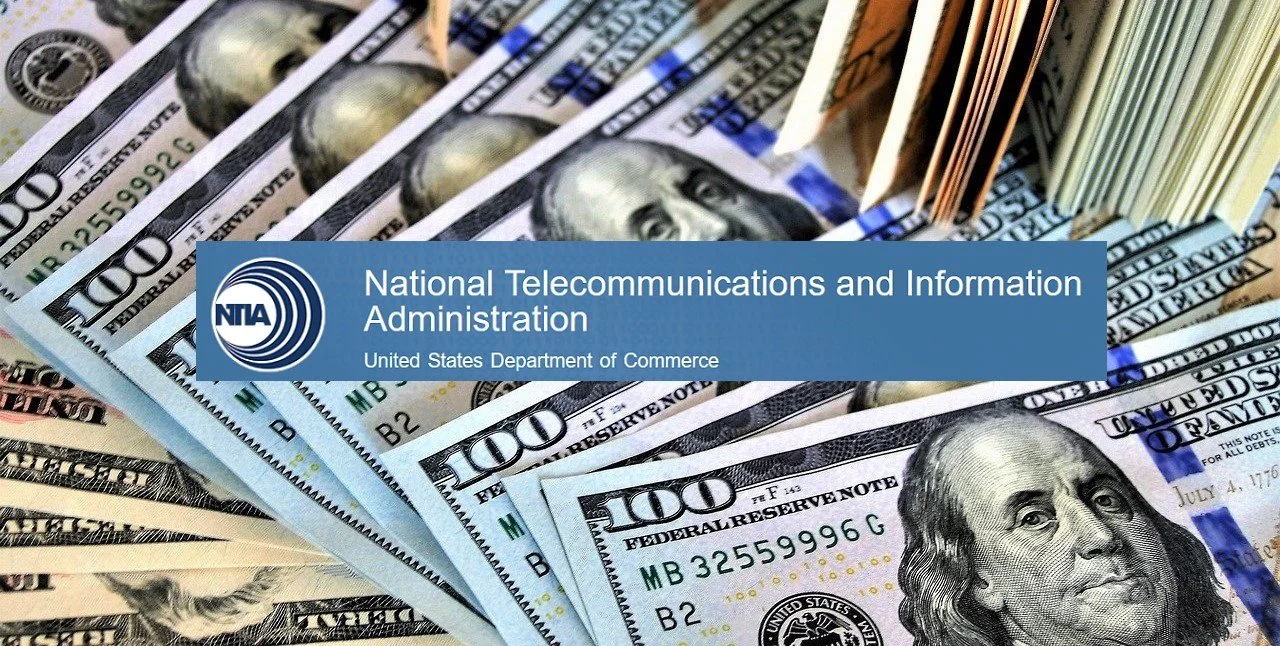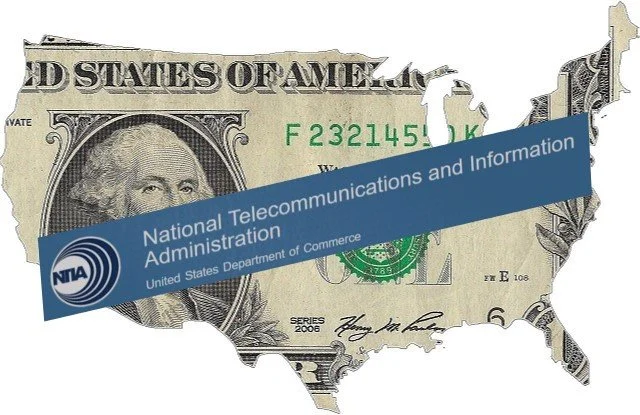Internet for All initiative – Infrastructure Investment and Jobs Act of 2021 Federal Broadband Funding Programs – News Update
The U.S. Department of Commerce has announced the launch of the Biden-Harris Administration’s $45 billion Internet for All initiative, which will be administered and implemented by the National Telecommunications and Information Administration. The Internet for All initiative is comprised of the three broadband funding programs authorized by the Infrastructure Investment and Jobs Act of 2021: Broadband Equity, Access, and Deployment (BEAD) Program ($42.5 billion); Enabling Middle Mile Broadband Infrastructure Program ($1 billion); and, State Digital Equity Act programs ($1.5 billion). NTIA has released Notices of Funding Availability for the BEAD Program and the Enabling Middle Mile Broadband Infrastructure Program.
34 States & Territories Submit Letters Of Intent To Participate In Broadband Equity, Access, And Deployment (BEAD) Program
May 18, 2022 – The U.S. Department of Commerce’s National Telecommunications and Information Administration (NTIA) has announced that 34 states and territories have submitted letters of intent to participate in the $42.45 billion Broadband Equity, Access, and Deployment (BEAD) Program. Letters of intent were submitted by the following states and territories: Alabama, Alaska, Arizona, Arkansas, American Samoa, California, Colorado, Connecticut, Delaware, Georgia, Hawaii, Kentucky, Louisiana, Maine, Massachusetts, Michigan, Mississippi, Montana, Nevada, New Hampshire, New Jersey, New Mexico, New York, North Carolina, Oregon, Pennsylvania, Puerto Rico, Rhode Island, Tennessee, United States Virgin Islands, Utah, Vermont, West Virginia and Wisconsin.
Created as part of the Infrastructure Investment and Jobs Act of 2021, the BEAD Program will provide $42.45 billion in grants to expand high-speed internet access by funding planning, infrastructure deployment, and adoption programs in all 50 states and U.S. territories. States and territories (eligible entities) will receive BEAD Program funding, and then using a competitive process, will award BEAD funding to “subgrantees” for the construction of broadband networks and projects. Subgrantees will be required to deploy their planned broadband networks and begin providing services within their project areas not later than four years after the date on which they receive their BEAD Program grant a state or territory.
The BEAD Program will prioritize grant funding for the expansion of broadband internet access to unserved locations (no access to Reliable Broadband Service at speeds of at least 25/3 Mbps) and underserved locations (no access to Reliable Broadband Service at speeds of at least 100/20 Mbps). “Reliable Broadband Service” is defined as broadband service that the FCC Broadband DATA Maps show is accessible to a location via: (i) fiber-optic technology; (ii) Cable Modem/ Hybrid fiber-coaxial technology; (iii) digital subscriber line (DSL) technology; or (iv) terrestrial fixed wireless technology utilizing entirely licensed spectrum or using a hybrid of licensed and unlicensed spectrum. Locations served exclusively by satellite, services using entirely unlicensed spectrum, or a technology not specified by the FCC for purposes of the Broadband DATA Maps, do not meet the criteria for Reliable Broadband Service and will be considered “unserved” for BEAD Program purposes.
To participate in the BEAD Program, an eligible entity must submit a letter of intent no later than 11:59 p.m. EDT on July 18, 2022. Either with its letter of intent or afterwards, an eligible entity that is a U.S. state, the District of Columbia, or Puerto Rico may request up to $5,000,000 in initial planning funds. Requests for initial planning funds not sent with a letter of intent must be submitted to NTIA by 11:59 p.m. EDT on August 15, 2022. Eligible entities that receive initial planning funds must submit their five-year action plans to NTIA no later than 270 days after receipt of initial planning funds.
Commerce Department Announces Launch Of Internet For All Initiative – The 2021 Infrastructure Act’s Broadband Funding Programs
May 13, 2022 – The U.S. Department of Commerce has announced the launch of the Biden-Harris Administration’s $45 billion Internet for All initiative, which will be administered and implemented by the National Telecommunications and Information Administration (NTIA). The Internet for All initiative is comprised of the following three broadband funding programs authorized by the Infrastructure Investment and Jobs Act of 2021:
Broadband Equity, Access, and Deployment (BEAD) Program ($42.5 billion);
Enabling Middle Mile Broadband Infrastructure Program ($1 billion); and,
State Digital Equity Act programs ($1.5 billion).
The BEAD Program will provide $42.45 billion in grants to expand high-speed internet access by funding planning, infrastructure deployment, and adoption programs in all 50 states, Washington D.C., and U.S. territories. States will receive an initial allocation of $100 million to support broadband planning efforts, and the remaining funding will be distributed using a statutorily defined formula that considers the number of unserved and high-cost locations in a state based on the FCC’s new broadband maps. States will then use BEAD Program grant funding to prioritize the expansion of broadband internet access to unserved locations (no access to 25/3 Mbps broadband service) and underserved locations (no access to 100/20 Mbps broadband service), followed by the provision of 1/1 Gbps broadband service to community anchor institutions. Pursuant to the BEAD Program’s timeline, the application window opens on May 13, 2022; letters of intent are due July 18, 2022; and initial planning funds applications are due August 15, 2022.
The Middle Mile Grant Program will provide up to $1 billion in grant funding for the construction, improvement, or acquisition of middle mile infrastructure. The program’s expansion of middle mile broadband infrastructure will reduce the cost of connecting areas that are unserved or underserved to the internet backbone. Entities eligible for funding include the following: a State, political subdivision of a State, Tribal government, technology company, electric utility, utility cooperative, public utility district, telecommunications company, telecommunications cooperative, nonprofit foundation, nonprofit corporation, nonprofit institution, nonprofit association, regional planning council, Native entity, economic development authority, or any partnership of two or more of these entities. The program’s application window opens on June 21, 2022, and closes on September 30, 2022.
The State Digital Equity Act Programs consist of three grant programs that promote digital equity and inclusion, which are designed to ensure that all people and communities have the skills, technology, and capacity needed to reap the full benefits of the digital economy. The three grant programs are: the State Digital Equity Planning Grant Program (a $60 million grant program for states and territories to develop digital equity plans); the State Digital Equity Capacity Grant Program (a $1.44 billion program for states and territories to fund an annual grant program for five years in support of digital equity projects and the implementation of digital equity plans); and the Digital Equity Competitive Grant Program (a $1.25 billion program to fund annual grant programs for five years to implement digital equity projects). The State Digital Equity Planning Grant Program is currently open. The other two programs will open later on a later date. The State Digital Equity Planning Grant Program application window opened on May 13, 2022. Planning applications or letters of intent are due on July 12, 2022.
NTIA Releases BEAD Program Notice Of Funding Opportunity
May 13, 2022 – The U.S. Department of Commerce’s National Telecommunications and Information Administration (NTIA) has released a Notice Of Funding Opportunity for the Broadband Equity, Access, and Deployment (BEAD) Program. The NOFO describes the requirements under which NTIA will award BEAD Program broadband grants. Created as part of the Infrastructure Investment and Jobs Act of 2021, the BEAD Program will provide $42.45 billion in grants to expand high-speed internet access by funding planning, infrastructure deployment, and adoption programs in all 50 states, Washington D.C., Puerto Rico, the U.S. Virgin Islands, Guam, American Samoa, and the Commonwealth of the Northern Mariana Islands.
Each U.S. state, DC, and Puerto Rico will receive an initial allocation of $100 million to support planning efforts including building capacity in state broadband offices and outreach and coordination with local communities, while another $100 million will be divided among the remaining U.S. territories for the same purposes. Remaining BEAD Program funding will then eventually be distributed using a statutorily defined formula that considers the number of unserved and high-cost locations in a state, based on the Federal Communications Commission’s new broadband maps.
BEAD Program grant funding will prioritize the expansion of broadband internet access to unserved locations (no access to 25/3 Mbps broadband service) and underserved locations (no access to 100/20 Mbps broadband service). Pursuant to the BEAD Program’s application timeline, the application window opens on May 13, 2022; letters of intent are due July 18, 2022; and initial planning funds applications are due August 15, 2022. The BEAD Program application packet and further guidance on the application process is available from the NTIA Grants Portal.
NTIA Releases Notice Of Funding Opportunity For Enabling Middle Mile Broadband Infrastructure Program – Application Window Opens June 21, 2022
May 13, 2022 – The U.S. Department of Commerce’s National Telecommunications and Information Administration (NTIA) has released a Notice Of Funding Opportunity for the Enabling Middle Mile Broadband Infrastructure Program. Created as part of the Infrastructure Investment and Jobs Act of 2021, the Enabling Middle Mile Broadband Infrastructure Program will provide up to $1 billion in grant funding “for the construction, improvement, or acquisition of middle mile infrastructure.” The program is intended “to expand and extend middle mile infrastructure to reduce the cost of connecting areas that are unserved or underserved to the internet backbone.”
The NOFO lays out the requirements under which NTIA will award Middle Mile Program grants. Entities eligible for Middle Mile grant funding include the following: a State, political subdivision of a State, Tribal government, technology company, electric utility, utility cooperative, public utility district, telecommunications company, telecommunications cooperative, nonprofit foundation, nonprofit corporation, nonprofit institution, nonprofit association, regional planning council, Native entity, economic development authority, or any partnership of two or more of these entities. NTIA expects to make Middle Mile grant awards within the following range: $5 million to $100 million. The period of performance for grants issued under the program ends five years from the date on which the funds are made available to the eligible entity.
The program’s application window opens on June 21, 2022, and closes on September 30, 2022. NTIA expects to complete its review and selection of successful applicants by February 16, 2023. NTIA expects that the start date for awards under the NOFO will be no earlier than March 1, 2023. Program application packets and additional information are available on the NTIA Grants Portal.
FCC, USDA, NTIA, & Treasury Join Interagency Agreement To Share Information On U.S. Broadband Funding & Deployment
May 12, 2022 – The Federal Communications Commission (FCC), U.S. Department of Agriculture (USDA), National Telecommunications and Information Administration (NTIA), and U.S. Department of the Treasury (Treasury) have entered into a Memorandum Of Understanding to facilitate the interagency sharing of information about U.S. broadband funding and deployment. Pursuant to the MOU, each agency will share information on data collected from broadband programs it administers with the other agencies. The agencies also will share information about projects that will receive funding from federal sources. The agreement is effective as of May 11, 2022, and has a term of two years.





